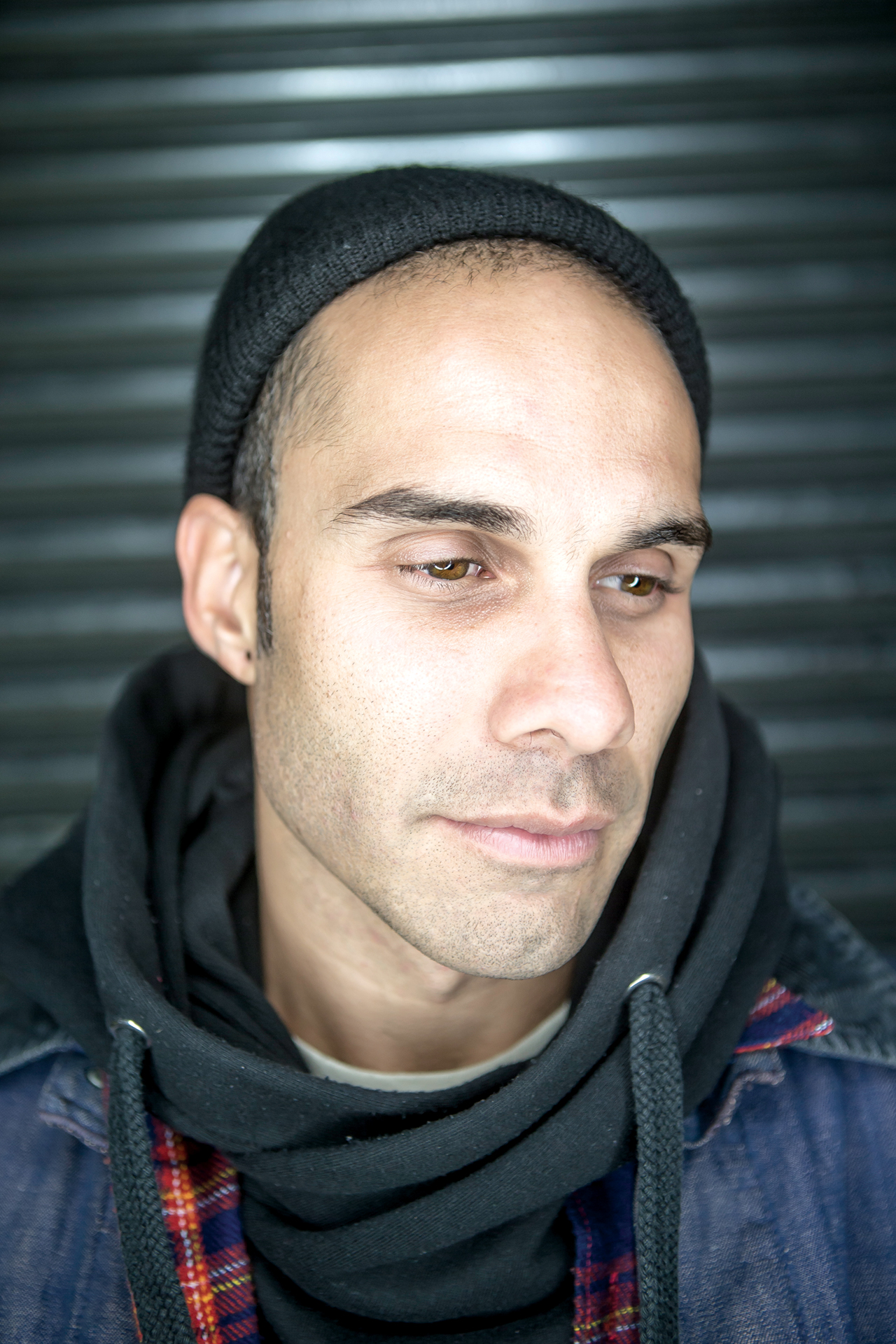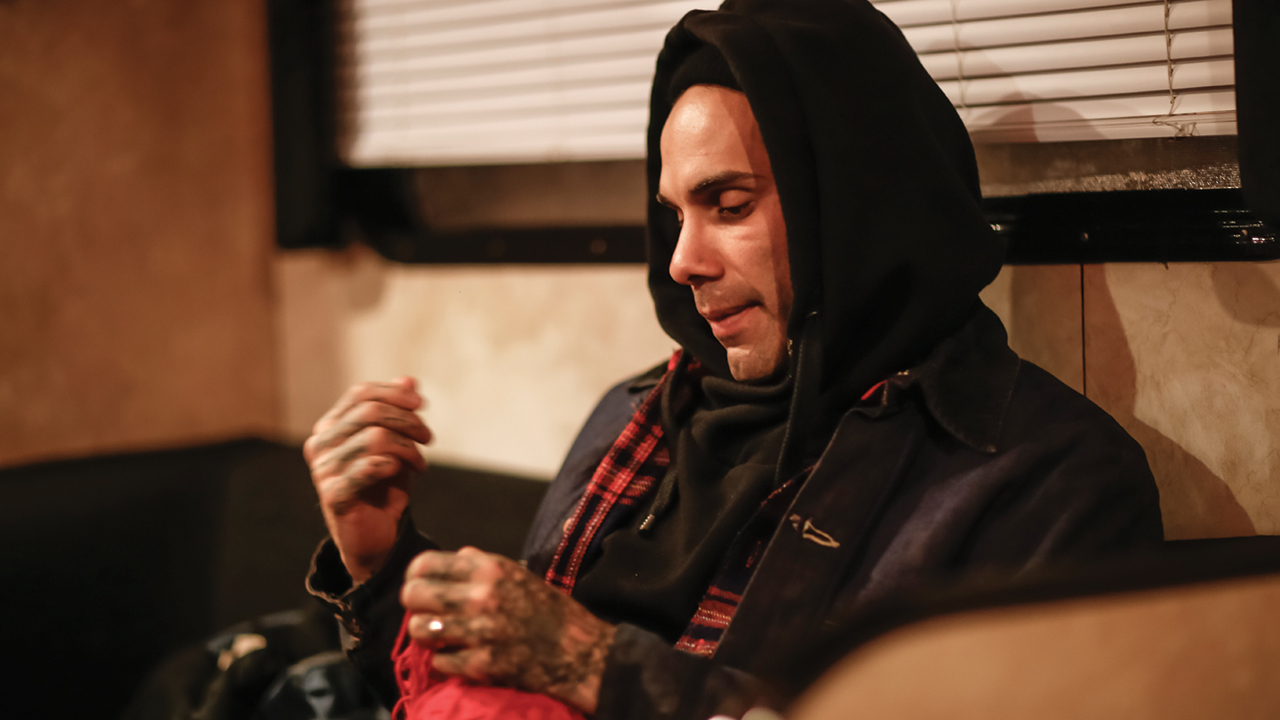“I believe so strongly in what I do, I don’t want it extinguished or lessened by the fear of death.” Sitting on a sofa on the top floor of Metal Hammer’s offices is Jason Aalon Alexander Butler, lying back into his seat and eating some snacks from a nearby café. Despite the weight of his words, he’s unassuming, genuinely polite and well-spoken – and he might just be the most vital voice in alternative music today. His band Letlive are infamous for their anarchic live shows – of which Jason is always the ringleader – and their powerful, emotive, socially and politically aware lyrics. Fourth album If I’m The Devil… is the most compelling and captivating of their career so far, withcrosshairs pointed firmly at the often taboo subjects of racism, feminism and sexuality. Of those three topics, the concept of race is very much at the top of Jason’s hit list. With a white mother and a black father, Jason grew up in the predominantly black area of Inglewood, California, with his younger sister and older half-brother. Crime, guns and gangs were on his doorstep – in fact, as he reveals to Hammer today, they were often too close for comfort.
“Some people came and shot our neighbour, so my mom came out and started yelling at them. Then they shot our windows out trying to shoot my mom,” Jason says, a degree of jadedness in his voice hinting that it was nothing out of the ordinary in the life he used to lead. “When you gotta try extra hard to make sure you reach your destination, whether that’s not getting caught by the police or saying the wrong thing to the wrong person, it gives you thick skin, but also a sense of endurance.”
However, avoiding trouble wasn’t always an option. At times, Jason had such disregard for his own skin he’d find himself in life-threatening situations, something alluded to in new track Another Offensive Song, in which he worries his “big mouth” will get him shot.
“People from different gangs turned up at my prom, and I was with my friends who associated themselves with another gang. I got called over by some dude who held a gun to a part of the body that is… vital. If he’d pulled the trigger, that would have been it. I said things I shouldn’t have said when he had the gun to me, but for some reason he didn’t do it.”
While Jason was able to count his blessings that day, not everyone manages to escape the barrel of a gun. Having seen his friend shot and killed in front of his mom’s house, the singer is keen not to sensationalise or romanticise gang culture.
“This shit is not cool,” he states firmly. “There’s a really big misunderstanding of what it’s like to be around violence. I’m not any cooler because someone pulled a gun on me. It’s this weird, twisted perversion of our environment and I do not wish to perpetuate it at all.”
Gang violence is rarely reported on with any degree of magnitude in the media. Stabbings and shootings have long been commonplace in areas such as Inglewood, Compton and South Central, yet there has been a lack of coverage from national TV and newspapers. However, in the past two years there has been a noticeable rise in the reporting of white cops killing black people in the street. Cases like Eric Garner, who died as a result of an chokehold applied by an NYPD officer, or 12-year-old Tamir Rice, who was fatally shot for playing with a toy gun in a park in Cleveland. Neither police officerwas indicted for their actions.
“My friend’s brother in Long Beach was shot by a police officer and was said to look like he was reaching for a gun, when in fact he was not armed,” reveals Jason. “He had no gang affiliation, no gang injunction they could place on him. He’s seen the Reaper by the hand of a police officer.”
Jason’s experiences with the police have formed a huge part of his identity, and are the basis for If I’m The Devil…’s first single, Good Mourning, America. In 2007, Jason was beaten, choked and arrested by police officers in the street while trying to walk his intoxicated friend home. He was charged with assaulting a police officer and had to face trial.
“After all the illegal negligence he performed to make me think he was trying to kill me, all they noted was that I headbutted him to get free,” says Jason. He describes the arrest: “It was very dehumanising. They treated me like an animal, they treated me like I was a threat, they treated me like they didn’t care if I lived or died. The emotional ineptitude is astounding – it’s amazing how much they don’t give a fuck.” But as luck would have it, when the trial came about, it turned out Jason knew the District Attorney and had been to school with his son. “
He knew that I was the advisor for a youth government programme, I was doing tons of volunteer work – they’re not the typical characteristics of a man that should be in jail for three to five years.” Jason was set free with probation, but this example of racial profiling, as he sees it, did nothing to assuage his distrust of the police.
“I don’t trust the police, because when they’re dispatched into areas, they’re authorised to use force to either subdue, minimise or extinguish these scenarios that are typically based off emotions. We as a people in Inglewood are rather emotional because we’re in the muck. When we called the police, they didn’t show up. When my neighbour got shot, they didn’t show up for 45 minutes. He could have died… The regard for our lives and our bodies was much less in my area than a mile down the road.”
That’s not to say that Jason has a hatred of all cops – his own half-brother is a police officer in Milwaukee. “My brother is one of five people I can count on my hand that actually inspire me to be better as a human being,” he notes. “It’s not that I don’t like cops; it’s the sense of authority and power that I would like to dismantle, rather than an actual person that’s adorned with a badge and a gun.”
Jason decided to write Good Mourning, America following a conversation at a protest for Michael Brown, the unarmed black teenager who was killed by a white officer in Ferguson, Missouri. And while race relations are undoubtedly one of the strongest issues affecting Jason’s life, he attends protests and rallies for a number of causes, and is especially concerned with protecting the environment for his future children. He also gets involved with grassroots community issues, and protested against the building of a big Kmart in Inglewood that would put local stores out of business. But is this his responsibility, just because he has a bigger platform than most?
“It’s your responsibility when you claim to be of the movement,” he answers. “Be about it if you’re gonna talk
about it – I think a lot of people out there are faking the funk. I think they’ve monetised revolution. Motherfuckers walking around with Che Guevara shirts who don’t even know who he is. When you do that it dilutes and harms the movement.”

Away from the global issues of race and equality, Jason has spent the three years since 2013’s immense The Blackest Beautiful finding himself, rediscovering who Jason Aalon Butler is, with the help of his new wife. Going through his 20s self-sabotaging any relationship he had, at the age of 27 Jason told himself that he may never find love – a painful and destructive viewpoint for someone so young. But as soon as he’d resigned himself to a life alone, he met his soulmate, giving a deeper dimension to the new record.
“I realised the idea of love is a real thing, and not only can I experience it, but I can share it in a form of eternity by getting married; I’m less afraid of showing myself,” he admits. “When I’m writing, there are no reasons for me to fear failure – I’m able to say these things with a safety net that is my newfound investment in another human being.”
It’s weird to hear Jason talk about the album in such an intimate way – the track Foreign Cab Rides sounds like a break-up song, which the singer reveals couldn’t be further from the truth. While he and his then-girlfriend, now-wife were on a break, Jason was away on tour and missed her so much he couldn’t eat or sleep, so took a taxi to her apartment to find out whether they could “see about this whole ‘being in love’ thing”. The foreign words heard at the start of the song are from that exact cab ride.
“I’m sat there being really anxious and scared, recording this cab ride because I knew it was some sort of pivotal moment in my life,” says Jason, staring at the floor, almost envisioning the journey. “She taught me what it means to be with another person in such an intimate manner. For me, every time I slept with somebody I was leaving a piece of myself with that person. Eventually I wanted to be emotionally connected in the act of intimacy, but it was so difficult for me to feel comfortable or safe with that person. It was a really fucked-up scenario for me with sex. I tried so many times to be a ‘normal’ person, but sexuality is a very complex thing.” It sounds like this intelligent yet flawed man sitting in north London in his leather jacket and beanie is slowly coming to terms with who he is. ‘Old Jason’ became ‘New Jason’ when he met his wife, and this new lifeforce has driven a new Letlive, reflected in If I’m The Devil…’s ambitious sounds. But despite the album’s soul-driven hymns and poppier leanings, it isn’t a cynical grab for mainstream attention.
“We’re not saying we want to be on the radio or in arenas – it’s just us trying be explorative as artists and sonically do what we’re capable of, but doing it tastefully,” says Jason. “We’re trying to make music that’s not stagnant.” If I’m The Devil… is far from stagnant. It’s more polished, features a string section and a gospel choir, is less hardcore, includes soul and funk elements, but keeps the aesthetic and power of Letlive at its core in a towering fusion of the past and present.
“I can’t get over the fact that I’m reckless or I do dumb shit,” says Jason. “I can’t act like it was never there, because it’ll come back. My teeth are all fucked-up from fighting when I was younger; a dude in an alleyway knocked my tooth right out of my mouth. I need to embrace the fact that I have been undesirable to some people and… to myself. It doesn’t define me, but it was a part of my personality.”
Wherever Jason may have been, it’s now obvious he’s much happier, more fearless and more comfortable in himself and what he’s doing. If If I’m The Devil… was the therapy he needed to exorcise his demons, he’s now ready to share them with the world. Be ready.
IF I’M THE DEVIL… IS OUT ON JUNE 10 VIA EPITAPH
